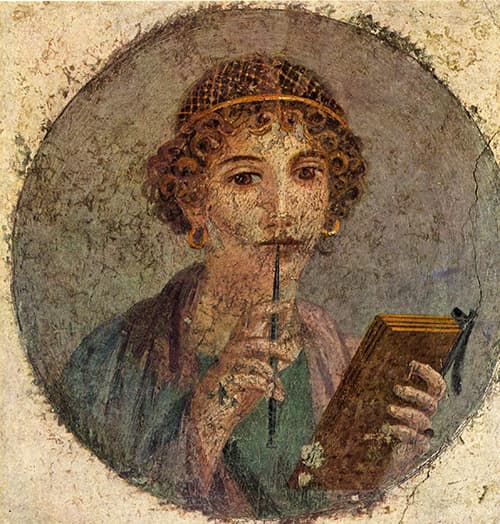Undergraduate
We offer courses at all levels, both in the original languages and in English, for majors and non-majors alike. We make no assumptions about a student's prior experience, and look to provide access to the ancient world to as many people as possible, in whatever form serves them best.
Course Offerings
Please note that courses in other departments, which may not be listed here, will sometimes carry credit towards the Minor in Ancient Civilization.
Language Study
For students wishing to begin language study, the department provides elementary and intermediate courses in Latin and Greek. These courses aim at preparing a student for more advanced study of ancient literature in the original languages. Elementary and intermediate courses in Modern Greek are also available. All these courses may be counted towards satisfying the University's undergraduate foreign language requirement.
Proficiency in Latin may be demonstrated through coursework, test scores, or by taking a placement exam.
Coursework: Satisfying the requirement through coursework requires successful completion of the second semester at the intermediate level or one semester above the intermediate level, i.e. Advanced or Advanced Intermediate Latin.
Test scores: Proficiency is defined by a score of 4 or 5 on the AP exam, 600 or better on the SAT subject test reading exam, or a score of I-5 or A on the ALIRA Latin exam.
Placement exam: The Latin placement exam can be taken online. To take the exam, students need to enroll in the "course," visit the Placement Exam site in Canvas, and then follow the simple directions posted there. The exam has two parts: a multiple choice grammar section and a short translation section. It should take about an hour. Once students have completed the exam, they must email Prof. Polt (christopher.polt@bc.edu) or Prof. Eshleman (kendra.eshleman@bc.edu).
| Elementary and Intermediate Language Courses - Offered Annually |
|---|
| Elementary Greek I-II |
| Intermediate Greek I–II |
| Elementary Latin I–II |
| Intermediate Latin I–II |
| Advanced Intermediate Latin (fall only) |
Ancient Culture (no Greek or Latin required)
A number of courses are offered in the literature, history, and culture of the ancient world, taught through works in English translation rather than through works in the original languages. Some of these will satisfy the University's Core Curriculum requirement in Literature, Cultural Diversity, History I, or Fine Arts. All of them are available to Classics majors, and they form especially the basis of the major cultures track and the interdisciplinary minor in Ancient Civilization. But, they are designed above all to make antiquity accessible to the undergraduate population at large. They are the most wide-ranging of our courses.
| Ancient Culture and Civilization - Selections Annually |
|---|
| Classical Mythology |
| Greek Civilization |
| Greek History (History Core) |
| Art and Archaeology of Homer and Troy |
| Art and Myth in Ancient Greece (Fine Arts Core) |
| Culture of Athenian Democracy |
| Drama and Society in Ancient Greece |
| Greeks and Barbarians (Cultural Diversity Core) |
| Death and Dying in Ancient Greece (Enduring Questions Core) |
| Dangerous Women in Classical Literature |
| The City of Rome |
| Roman History (History Core) |
| Roman Spectacles |
| Roman Religion |
| Roman Law and Family |
| Ancient Medicine |
| Gender and Sexuality in Ancient Rome |
| Multiculturalism in the Roman Empire |
| Roman Comedy |
| Rome: Art, Regime, and Resistance (Enduring Questions Core) |
| Beast Literature (Literature Core) |
| The Chorus: Ancient and Modern (Arts Core) |
| Greco-Roman Egypt |
| Everyday Aphrodite: Classics and the History of Sexuality |
Advanced Study in Latin and Greek
At the advanced level (3000 numbered), courses are offered on the major authors and genres of Greek and Roman literature. The emphasis here is on the close reading and appreciation of texts in the original ancient language. Typically these courses are taken by Classics language track majors and graduate students, but any student who has sufficient training in ancient Greek or Latin to keep up with the class is welcome (usually completion of our Intermediate sequence, a 4 or 5 on the AP Latin exam, or at least a 600 on the SAT II).
Proficiency in Latin may be demonstrated through coursework, test scores, or by taking a placement exam.
Coursework: Satisfying the requirement through coursework requires successful completion of the second semester at the intermediate level or one semester above the intermediate level, i.e. Advanced or Advanced Intermediate Latin.
Test scores: Proficiency is defined by a score of 4 or 5 on the AP exam, 600 or better on the SAT subject test reading exam, or a score of I-5 or A on the ALIRA Latin exam.
Placement exam: The Latin placement exam can be taken online. To take the exam, students need to enroll in the "course," visit the Placement Exam site in Canvas, and then follow the simple directions posted there. The exam has two parts: a multiple choice grammar section and a short translation section. It should take about an hour. Once students have completed the exam, they must email Prof. Polt (christopher.polt@bc.edu) or Prof. Eshleman (kendra.eshleman@bc.edu).
| Greek and Latin Literature Reading Courses - Selections Annually |
|---|
| Homer |
| Aphrodite |
| Herodotus |
| Thucydides |
| Sophocles |
| Euripides |
| Greek Rhetoric |
| Plautus and Terence |
| Lucretius |
| Catullus |
| Cicero and Sallust: Catiline |
| Cicero's Political Thought |
| Roman Civil War Literature |
| Livy |
| Roman Elegy |
| Latin Pastoral Poetry: Vergil and Tibullus |
| Vergil's Aeneid |
| Ovid's Fasti |
| Tacitus |
| Apuleius' Golden Ass |
Many courses offered by the Classical Studies Department also satisfy University Core requirements in the Arts, Modern History, Cultural Diversity, and Literature/Enduring Questions.
| Arts Core |
|---|
| ARTH2206/CLAS2208: Art and Myth in Ancient Greece |
| THTR2286/CLAS2285: The Chorus, Ancient and Modern: Forms of Communal Performance and the Body Politic |
| History Core |
|---|
| CLAS1701: Death in Ancient Greece: Achilles to Alexander the Great |
| CLAS1702: Rome: Art, Regime, & Resistance |
| CLAS1703: St. Petersburg: Dream & Reality |
| HIST2201/CLAS2205: Greek History |
| HIST2205/CLAS2206: Roman History |
| Cultural Diversity |
|---|
| CLAS2207: Greeks and Barbarians |
| CLAS2268: The Christian East: Orientale Lumen |
| Literature Core/Enduring Questions |
|---|
| CLAS1701: Death in Ancient Greece: Achilles to Alexander the Great |
| CLAS1702: Rome: Art, Regime, & Resistance |
| CLAS1703: St. Petersburg: Dream & Reality |
| CLAS1704: What is the Good Life? Tolstoy to Chekov |
| CLAS1705: Enslavement in Greece and Rome |
Additional Ancient Language Study Opportunities

The Morrissey College of Arts and Sciences and the School of Theology and Ministry offer coursework and host reading groups in the languages of the Bible, Church Fathers (Patristic Texts), ancient Greece and Rome both for graduate and undergraduate students.
Questions?
Students and prospective students wishing to discuss how a course or a program might suit them should contact a faculty member for an appointment. Our FAQ page also addresses many common questions.




